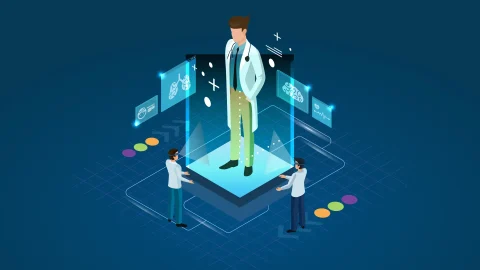
Artificial Intelligence (AI) is not just a futuristic concept—it’s already making a powerful impact on various sectors, especially healthcare. AI in healthcare is rapidly transforming how doctors diagnose diseases, how hospitals manage operations, and how patients receive personalized treatments. From smart diagnostic tools to robotic surgeries, artificial intelligence is ushering in a new era of precision and efficiency in medical services.
The Power of AI in Healthcare
At its core, AI in healthcare involves using machine learning algorithms and data analytics to emulate human cognition in analyzing complex medical data. This allows healthcare professionals to make better-informed decisions and improve patient outcomes.
One of the most significant benefits of artificial intelligence in medicine is its ability to process vast amounts of information in real time—far more than any human doctor could. This capability is driving major innovations across diagnostics, treatment planning, and patient monitoring.
AI-Driven Medical Diagnostics
Early and accurate diagnosis is critical to effective treatment. AI tools are being used to detect diseases such as cancer, cardiovascular disorders, and neurological conditions with remarkable accuracy. For example, medical diagnostics AI systems can analyze X-rays, CT scans, and MRIs faster and more accurately than many human radiologists.
These systems are trained on thousands of images and clinical reports, allowing them to recognize even subtle anomalies. This not only improves diagnostic precision but also speeds up the entire process, enabling quicker interventions.
Personalized Healthcare Powered by AI
Traditional medicine often takes a “one-size-fits-all” approach. AI changes that by enabling personalized healthcare, where treatment plans are tailored to individual patients based on their genetic makeup, lifestyle, and health history.
Using predictive analytics, AI can identify which treatments are most likely to be effective for a specific patient. This leads to better outcomes and reduces unnecessary treatments or side effects. AI-driven apps are also helping patients manage chronic conditions like diabetes and hypertension through real-time data and smart recommendations.
The Role of Robotic Surgery
Another remarkable innovation in AI in healthcare is the use of robotic surgery. These systems assist surgeons by providing greater precision, flexibility, and control than traditional techniques. While the surgeon remains in control, the AI-enhanced robot helps perform complex procedures through tiny incisions, resulting in less pain, faster recovery times, and minimal scarring.
As robotic systems evolve, AI is also being used to provide real-time insights during surgery, enhancing decision-making and reducing the risk of human error.
Managing Big Data with Healthcare Analytics
The healthcare industry generates a staggering amount of data every day. Managing and interpreting this data manually is nearly impossible. This is where healthcare data analytics powered by AI becomes essential.
AI algorithms analyze patient records, clinical studies, and real-time monitoring data to identify trends and make actionable recommendations. Hospitals are using these insights to improve workflow, predict patient admissions, and manage resources more efficiently.
Furthermore, AI helps in early outbreak detection and public health management by analyzing data from multiple sources, including wearable devices and electronic health records.
Ethical Considerations and Future Outlook
While the potential of AI in healthcare is vast, it comes with challenges. Ethical concerns around data privacy, algorithmic bias, and the need for regulatory oversight must be addressed. Transparency in how
AI models make decisions is critical for trust and safety.
That said, the future of AI in medicine looks promising. With continuous advancements in machine learning, natural language processing, and medical imaging, we can expect AI to become an even more integral part of global healthcare systems.
Conclusion
AI in healthcare is not just a technological breakthrough—it’s a medical revolution. From enhancing diagnostics and surgery to enabling personalized treatment and efficient data management, artificial intelligence is improving healthcare outcomes in unprecedented ways. As innovation continues, so too will our ability to deliver smarter, faster, and more personalized patient care.